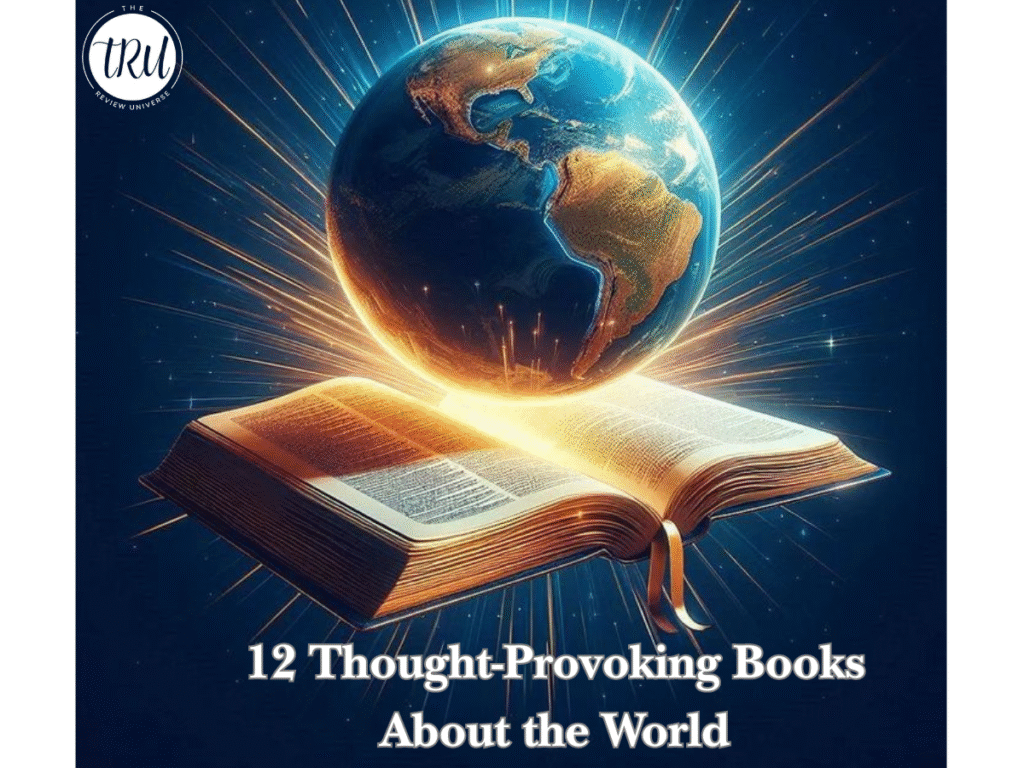
Explore 12 thought provoking books about the world that challenge your understanding of society, humanity, time, death, and the universe. From Orwell to Harari, these reads offer deep insights into modern life and the human condition.
Book reading is one of the oldest and most enriching habits in human history. It is not only a source of knowledge but also a powerful tool for imagination, personal growth, and emotional development. Whether it is fiction, non-fiction, poetry, or biographies, books offer a window into different worlds, cultures, and perspectives. Reading helps improve vocabulary, concentration, and critical thinking skills.
In today’s fast-paced digital age, where screen time dominates much of our daily lives, the habit of reading books remains a valuable and grounding practice.
Here, we are going to look at 12 Thought Provoking Books About the World
- “Brave New World” by Aldous Huxley
Brave New World makes you question whether comfort and pleasure are worth sacrificing freedom, individuality, and truth. As a Thought-Provoking Book, It shows how technology and consumerism can subtly control society without force. Ultimately, it challenges what it truly means to live a meaningful, human life.
- “1984” by George Orwell
1984,a Thought-Provoking Book by George Orwell makes you think deeply about how language, surveillance, and propaganda can be used to control thought and suppress truth. It warns of a world where freedom is crushed not by pleasure, but by fear, censorship, and constant monitoring. The novel forces you to consider how power can distort reality and manipulate people into accepting oppression as normal.
- “Sapiens: A Brief History of Humankind” by Yuval Noah Harari
Sapiens: A Brief History of Humankind by Yuval Noah Harari makes you think deeply about how human history is shaped not just by biology or survival, but by shared beliefs, myths, and social constructs. It challenges assumptions about religion, capitalism, and progress, showing how imagined realities have unified and divided us. The book forces you to reflect on what it truly means to be human—and how our choices today shape the future of our species.
- “Being and Time” by Martin Heidegger
Being and Time, a Thought-Provoking Book, by Martin Heidegger makes you think deeply about what it means to be—not just as an abstract idea, but as a personal, lived experience. Heidegger challenges us to confront our own existence (what he calls Dasein), especially in relation to time, death, and authenticity. The book compels you to question everyday assumptions and recognize how often we live in authentically, distracted from the fundamental questions of life.
- “Between the World and Me” by Ta-Nehisi Coates
Between the World and Me by Ta-Nehisi Coates makes you think deeply about race, identity, and what it means to live in a Black body in America. Written as a letter to his son, it confronts the harsh realities of systemic racism, fear, and inherited trauma with raw honesty. The Thought-Provoking Book urges reflection on how history, power, and inequality shape both personal lives and national narratives.
- “The Doors of Perception” by Aldous Huxley
The Doors of Perception by Aldous Huxley makes you think deeply about the nature of reality, perception, and consciousness. Through his experience with the psychedelic mescaline, Huxley explores how the mind filters and limits what we perceive, questioning whether our everyday experience is just a narrow slice of a greater truth. This Thought-Provoking Book challenges you to reconsider how culture, language, and the ego shape—and often restrict—our understanding of the world.
- “The Denial of Death” by Ernest Becker
The Denial of Death by Ernest Becker makes you think deeply about how the fear of death underlies much of human behavior, culture, and conflict. Becker argues that we create heroic narratives, religions, and social systems to shield ourselves from the terror of our mortality. The book challenges you to confront death honestly, suggesting that true freedom comes from accepting our impermanence rather than denying it.
- “The Fabric of the Cosmos” by Brian Greene
The Fabric of the Cosmos by Brian Greene makes you think deeply about the nature of space, time, and reality itself. By exploring complex ideas from physics—like relativity and quantum mechanics—it reveals how the universe is far stranger and more interconnected than our everyday experience suggests. The book invites you to reconsider what you think you know about the world and your place within this vast cosmos.
- “The Beginning of Infinity” by David Deutsch
The Beginning of Infinity by David Deutsch makes you think deeply about the limitless potential of human knowledge and progress. It argues that through reason, science, and creativity, there are no fundamental limits to what we can understand or achieve. The book challenges you to embrace optimism about solving problems and shaping the future, while also reflecting on the nature of explanation and reality.
- “Thinking, Fast and Slow” by Daniel Kahneman
Thinking, Fast and Slow by Daniel Kahneman makes you think deeply about how our minds work by revealing the two systems that drive our thinking: the fast, intuitive reactions and the slow, deliberate reasoning. It exposes the biases and errors that often cloud our judgment, even when we think we’re being rational. The book challenges you to become more aware of your own thought processes and decision-making habits.
- “The Lucifer Effect” by Philip Zimbardo
The Lucifer Effect by Philip Zimbardo makes you think deeply about how ordinary people can commit evil acts under certain circumstances. Drawing on his famous Stanford Prison Experiment, Zimbardo explores how situational forces, authority, and group dynamics can override personal morals. The book challenges you to reflect on the fragile boundary between good and evil within society and yourself.
- “Homo Deus: A Brief History of Tomorrow” by Yuval Noah Harari
Homo Deus: A Brief History of Tomorrow by Yuval Noah Harari makes you think deeply about the future of humanity as technology, artificial intelligence, and biotechnology rapidly evolve. It explores how these advances could reshape what it means to be human, raising ethical questions about power, consciousness, and immortality. The book challenges you to consider both the possibilities and dangers of our quest to become “gods” shaping our own destiny.
Read More Articles: 10 Magical Realism Books That Blur the Line Between Reality and Fantasy


Pingback: Our Pick of the Best Books on Mental Health This Decade (2005-2023) - The Review Universe